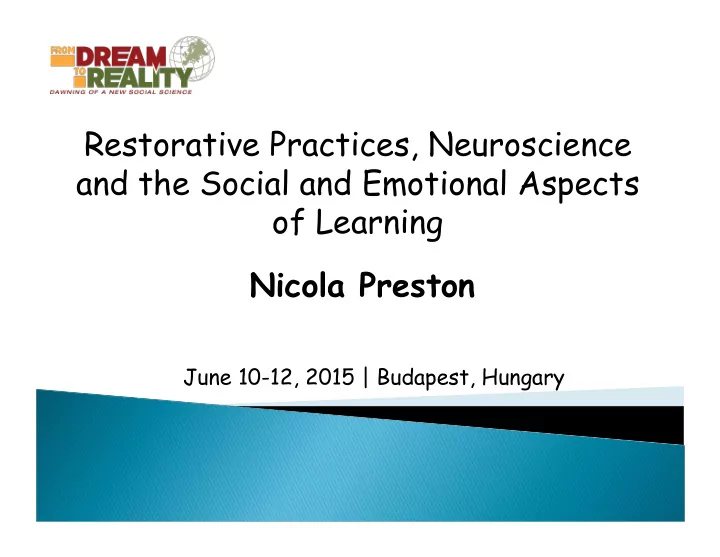

Restorative Practices, Neuroscience and the Social and Emotional Aspects of Learning Nicola Preston June 10-12, 2015 | Budapest, Hungary
The Affects http://www.tomkins.org/what-tomkins-said/introduction/nine-affects- present-at-birth-combine-to-form-emotion-mood-and-personality /
• Affect Script Psychology Silvan Tomkins • Reintegrative shaming John Braithwaite • Chronic Learning Shame Graeme George
Discarding The Deficit Model Harry and Klingner http://www.ascd.org/ publications/educational- leadership/feb07/vol64/ num05/Discarding-the- Deficit-Model.aspx Deficit, diagnosis and risk factors Labels and stigma
• Approximately 8% of five year olds entering school in England have significant difficulties with speech and/or language. • Speech, language and communication needs strongly linked to deprivation and poverty in the early years. Up to 55% of children in deprived areas experienced difficulties at age five and do not have the basic skills required to read and write. • These needs have a profound impact on: Educational attainment and employability. • Behavioural issues, social skills and esteem. • Poor mental health and access to healthcare services. • Offending. • • 65% of offenders have a language difficulty of which 20% scored at the “severely delayed” level in assessment (Gregory and Bryan, 2010).
• Neuroscience and Social Emotional Learning The Neuroscience of Restorative Justice https://www.ted.com/talks/ daniel_reisel_the_neuroscience_of_restorative_jus tice?language=en The Heart Brain connection https://www.youtube.com/watch?v=o9fVvsR-CqM
• Social and Emotional Learning • Circles • Proactive and reactive opportunities http://www.casel.org/ Preston, N. - forthcoming chapter in The Psychology of Restorative Justice http://www.ashgate.com/isbn/9781472455307
Creating a restorative climate?
Contact me at: nicolapreston@iirp.edu
Recommend
More recommend